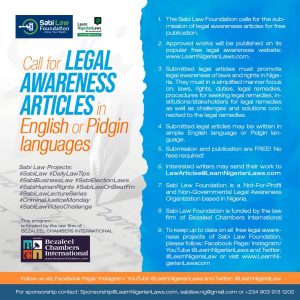An English marriage with one who is already validly married to another person is not a marriage. No matter how valid an English marriage is in the eyes of the couple, clergy, relatives, church and the society, it must equally be valid in eyes of law, for such marriage to be legal, lawful and valid. The religious books urge their followers to respect laws and constituted authorities; for an English marriage to be legal it must be in accordance with the provisions of the Marriage Act of 1914, irrespective of the religious inclinations of a couple. This work a guide showing detailed steps to making and contracting a valid English (Statutory/Legal/Court) marriage in the eyes of Nigerian laws. Common terms like court marriage, church marriage, traditional marriage and customary marriage were examined; showing their procedures and legality.
Woe betide, a being who lives in a celebrated delusion that seems like a perfect union, believing he/she is in an English marriage, for he/she is one in an illegal contract that can never be enforced, while his/her children from such mirage are on a perpetual unmeritorious regret. The legality of a person’s marriage may not border him/her, until issues of rights, privileges, international employment, travel visa, will, inheritance, divorce, child custody, guardianship, annuity, insurance and burial arises.
English marriage is a union between one man and one woman for life to the exclusion of all other persons. It is a sacrosanct union that begets lots of rights, benefits, duties, privileges and responsibility for couples and offspring from such union. To say the least, couples (husbands and wives) are protected from certain criminal charges and responsibilities, their children enjoy exclusive rights of inheritance while native law and customs cannot bind or limit them.
By the way, there are two major types of marriages in Nigeria; English marriage (Statutory, Court or Registry marriage) and Traditional marriage (Customary, Native, Cultural marriage or Pure religious/church marriage without government notices). In the Nigerian traditional and customary law system, marriage is not restricted to just a man and a woman rather a man and many wives and vice versa. Traditional marriages do not enjoy the full rights accorded to English marriage (that is marriage according to the law).
It is obvious, that in our present day Nigeria, many couples perform both English marriage (often referred to as “white wedding” “church wedding” and “court wedding”) and traditional marriage (often referred to as “Igba-nkwu”) to satisfy all interests, practises and pressures. That is okay, and acceptable in law. Same couple (the same husband and wife) can marry each other under the traditional/customary law and subsequently marry each other under the law.
However, a man or a woman married under the traditional/customary law cannot subsequently marry under the English marriage/law a different person other than his/her customary wife /husband. Doing such is an offence punishable with five years imprisonment (section 46 of Marriage Act). Hear this, it is an offence for same couple to first marry according to the law “English Marriage” and then subsequently marry themselves according to the traditional/customary law. Such act is punishable with five years imprisonment as prescribed in section 47 of the Marriage Act. Many couples in a bid to maximise time, minimise cost and avoid waste are guilty of the above offence. Hence, the trend of “white wedding” in the morning and traditional marriage in the afternoon or anytime later is illegal and a punishable offence.
STEPS TO A LEGAL ENGLISH MARRIAGE?
In our modern society, many desire and strive for a decent home and a lovely married life but often time don’t get such owing to their ignorance. Many plan and celebrate their marriages without consulting their lawyers to educate and advise them on proper and legal means to marriage; hence they end up living in a web of errors. Ahead of meeting with a wedding planner, prospective couple should engage the services of their lawyer.
There are laid down procedures and requirements that must be fulfilled before an English marriage can be legal and lawful. The Marriage Act of 1949 governs all valid English/Statutory marriages made in Nigeria or outside Nigeria (among two Nigerians in the Nigerian High Commission). Please note that no other style or method of English marriage that is accepted and legal except that, which is explained below.
The steps to English marriage are essential and sacrosanct. Whether a person wants a Bishop, an Archbishop or a General Overseer to wed him, he/she must start the process of English marriage from step 1 and end in step 3. Where there is a missing step, the marriage cannot be a valid English marriage, it may just be a mere church marriage without government notices, legal validity and benefits.
In summary, a prospective couple must give notice of their marriage to the Registrar of marriage in their Local Government Area. The Registrar would in turn register such notice in the “Marriage Notice Book” and equally cause same notice to be published on his door and notice board at the local government office for twenty-one (21) days. During the twenty-one days, the general public is expected to report any reason (make petitions) why the prospective couple should not be wedded.
Where there is no protest from the public to the impending union, at the expiration of 21 days, the Registrar of Marriages shall issue a Registrars’ Certificate to the couple. The certificate empowers the prospective couple to go ahead and celebrate their marriage (exchange of vows) within three months. Such exchange must be done in the public, often in a licensed place of worship (church) and before a recognised minister/clergy of a religious body/denomination. (At that stage, most people refer to such as “church wedding”).
Some prospective couples prefer to celebrate their marriages (exchange vows) not in a church rather in the office of the Registrar of marriages, before the Registrar of marriages and a few witnesses. (At that stage, people refer to such as “Court wedding”). In all, the two methods are valid and with the same legal benefits and responsibilities, so far as they start with valid marriage notices in the Marriage Registry (it is a matter of convenience).
STEP 1:
Give Notice Of Marriage To The Registrar Of Marriage:
In Local Government Areas there are Registrars of marriages, who register marriages conducted within their Local Government Areas. The Registrars often have offices in Local Government Area headquarters/Secretariat or in Court premises. The first step to a valid English marriage is the giving of notice of marriage to the Registrar of Marriages by an intending couple. The notice is given by filling and signing a form after payment of a prescribed fee in the office of the Registrar. The Registrar of Marriages would cause the notice to be entered in the “Marriage Notice Book” and same published on the outer door of his office and the notice board of the Local Government Area.
After the expiration of 21 days from the day of publication of notice, the Registrar of Marriages shall issue a “Registrar’s Certificate” to the prospective couple, where there were no objections from the public against the proposed marriage. The Registrar’s Certificate is a proof that notice of the pending marriage has been given and that couple should go ahead to celebrate their marriage in any church/mosque or the office of the Registrar of Marriages. Please, note that certificate can only be issued where the couple are not blood relations and one of the couple has been resident within the Local Government Area they intended into celebrate their marriage, for at least 15 days and none of the couple is below 21 years of age or married to another person.
STEP 2:
Celebrate Marriage In licensed Church or Office
Three (3) months after the issuance of a Registrar’s Certificate by the Registrar of Marriages, the concerned prospective couple are expected to visit a licensed place of worship (licensed church/mosque building) or stay in the Registrar’s office to celebrate their marriage. Every celebration of marriage in a church must be done between the hours of 8.00 am and 6.00 pm in the presence of at least two witnesses apart from the officiating minister. If it is to be celebrated in the office of a Registrar of marriage it must be between the hours of 10.00 am and 4.00 pm with open doors. If after the expiration of 3 months from the date of issuance of a Registrar’s certificate, the marriage is not yet celebrated, all notices and certificates will become void (invalid). And, the entire processes must start afresh for a valid marriage to held.
Celebration of marriage must be either in a licensed place of worship (church/mosque building) under the supervision of registered clergy of the religious body/denomination (church/mosque) or in the office of the Registrar of Marriages. Please, be warned that it is not all buildings of churches, ministries, prayer centres and healing outfits that are licensed places for celebration of marriages. Note further, that where a church building is a licensed place for celebration of marriage, it is only a recognised Minister (Clergy) of the church/denomination that can wed people in the licensed building of the church. Hence, for example, it will be illegal for a Catholic priest to wed a couple in a licensed building of the Anglican church. Let it be known to all that all valid marriages starts from step 1 and the certificate obtained in step 1 gives a prospective couple power to embark on step 2. No one can jump step 1 and start his/her marriage by mere celebration of marriage in church. Although, it is not out of place to equally give 21 days notice in the church (marriage ban) such can never substitute the marriage notice which is to be given or done through the Registrar of Marriages in the Marriage Registry. The Supreme Court has warned churches and clergies/ministers to desist from wedding couples who have not obtained a Registrar’s Certificate, that should empower them to be wedded, for it is an offence punishable with five years imprisonment (section 42 Marriage Act). A marriage celebrated in an unlicensed place or by an unrecognised minister/clergy of a religious body is null and void, if the couple knowingly and wilfully allowed such celebration of marriage (wedding ceremony).
While some people celebrate their marriage in the church, some prefer to do same in the office of the Registrar of marriages. Ignorantly, most people refer to celebration of marriages in Registrar’s office as “court marriage” and do get unnecessarily scared of such. A celebration of marriage done either in church or in Registrar’s office after the issuance of Marriage Registrar’s certificate, are of same with the same benefits and legal implications.
STEP 3:
Signing of Marriage Certificate:
Marriage rites do not end with exchange of vows rather with the signing of marriage certificate by the couple before their two (2) witnesses and the officiating minister (clergy). Just like any other contract, what has been orally exchanged/declared must be evidenced in writing via a marriage certificate.
The Registrar of marriages sends “books of marriage certificates” in duplicate and with counterfoils to all licensed places of worship. Immediately, after the celebration of a marriage, the officiating clergy must provide the “Book of Marriage Certificates”, fill its form and have same signed by the couple, witnesses and the clergy. The officiating minister must hand over to the couple their marriage certificate while the minister retains a duplicate.
The duplicate copy of a marriage certificate, must be sent to the Registrar of Marriages within seven (7) days after the celebration of marriage. The Registrar of Marriage upon receiving such certificate files it accordingly. Couples are advised to make sure the officiating priest transmits duplicates of their marriage certificates to the Registrar of Marriages for proper filling. This will ensure that whenever a search is conducted in the Marriage Registry, details of couples will be found.
I must state that in special circumstances, in special circumstances, the Minister of Internal Affairs may issue a “License to Marry” to a couple which will authorise their celebration of marriage at any place/venue they so desire and without a Registrar’s Certificate but before a recognised clergy or the Registrar of Marriages. This is possibly what some celebrities employ in having their valid marriages in parks, stadiums, boats and other places outside a licensed place of marriage and without waiting/issuing marriage notices.
It should be noted that a marriage is invalid if, in the knowledge and wilfulness of the couple:
a. It was celebrated under a false name or names or
b. It was celebrated without a Registrar’s certificate or
c. It was celebrated in a place other than a licensed place of worship or the office of the Registrar of marriages or
d. It was officiated by a person other than a recognised minister of some religious denomination.
Thank you!
Sabi Law Projects:
#SabiLaw
#DailyLawTips
#SabiBusinessLaw
#SabiElectionLaws
#SabiHumanRights
#SabiLawOnBeatFm
#SabiLawLectureSeries
#CriminalJusticeMonday
#SabiLawVideoChallenge
Speak with the writer, ask questions or make inquiries on this topic or any other via onyekachi.umah@gmail.com, info@LearnNigerianLaws.com or +2348037665878 (whatsapp).
To receive free Daily Law Tips, join our free WhatsApp group via https://chat.whatsapp.com/GAEPC3mH1ik0Ghq0yvzbvv or Telegram group, via the below link: https://t.me/LearnNigerianLaws
To keep up to date on all our free legal awareness projects of Sabi Law Foundation, follow us via
Facebook Page:@LearnNigerianLaws, Instagram: @LearnNigerianLaws, Twitter: @LearnNigeriaLaw and YouTube: Learn Nigerian Laws
Please share this publication for free till it gets to those that need it most. Save a Nigerian today! NOTE: Sharing, modifying or publishing this publication without giving credit to the author or Sabi Law Foundation is a criminal breach of copyright and will be prosecuted. This publication is the writer’s view not a legal advice and does not create any form of relationship. You may reach the writer for more information.
This publication is powered by www.LearnNigerianLaws.com {A Free Law Awareness Program of Sabi Law Foundation, supported by the law firm of Bezaleel Chambers International (BCI).} Sabi Law Foundation is a Not-For-Profit and Non-Governmental Legal Awareness Organization based in Nigeria.
























































11 Responses
Great job Umah, keep it up!!!
Good write up. …More grease to your elbow
A good dissecting of the issues of marriage under the marriage Act, making it easy for writers of this article to take correction and to advise properly for any marital problems for future couples to enjoy marital bliss under the Law. Thumbs up.
This post is an eye opener. Just reading through I discovered that most about-to-wed couples are ignorant about the 4 statutory steps for legal marriage, and most people are loving the white-before-trad trend. Thanks for enlightening us.
A well researched opinion. Besides, you are already gathering intimidating profile. Proud of you. More power to your elbow.
Section 47 of Marriage Act, did not specify if it is between the same parties or with a third party. So in my humble view, i think it will be safer and more realistic to think that the provision was address the point where a third party is involved as against your proposition with respect to section 47 of Marriage Act . Your courage is admired. Thanks